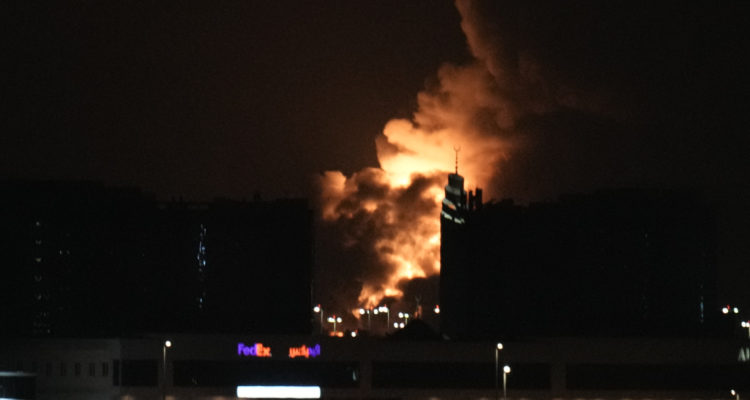“The international community must act against this aggression that targets innocent civilians and global energy supplies.” demanded the Saudi ambassador to the U.S.
By Batya Jerenberg, World Israel News
The Iranian-backed Houthi terrorist group in Yemen hit oil tanks near the Saudi Arabian city of Jeddah Friday night in a missile strike that was part of a larger attack on several Saudi sites.
While a huge fire erupted in two tanks owned by the state’s Aramco company, Saudi officials said, the airstrike caused no injuries or deaths. The fire has been brought under control.
Princess Reema bint Bandar al-Saud, Saudi ambassador to the U.S., made no bones about who was behind the aggression against her country and what should be done about it.
“The Iran-backed terrorist Houthis continue to attack our civilians, infrastructure and energy facilities with Iranian-made missiles and UAVs with impunity,” she charged. “The international community must act against this aggression that targets innocent civilians and global energy supplies.”
The Saudi energy ministry said that the kingdom “would not bear responsibility” for any disruptions in oil supplies due to the attacks, putting the blame solely on Iran for supplying the offensive weapons being used in the airstrikes.
The mention of Iran’s role in decreasing the world’s oil supplies through terrorism is related to two concurrent areas of concern: the reportedly soon-to-be-signed nuclear deal with the Islamic Republic, which would send billions of dollars to the regime that it could use to further support its malign activities in the region, and the need to replace Russian energy suppliers, especially in Europe, due to harsh sanctions over the country’s ongoing invasion of Ukraine.
Saudi leaders reportedly rejected U.S. President Joe Biden’s request to raise oil production to offset the forced Russian shortage and to lower gas prices, angered over their interests not being taken into account in the nuclear negotiations with Iran.
The seven-year battle over Yemen is considered a proxy war between the leading Sunni Arab nation and the Shiite Persian republic that are on opposite sides of the centuries-old Islamic divide.
Iran denies that it materially supports the Houthi side in its attempt to take over Yemen, whose official government is backed by an Arab coalition mainly consisting of Saudi Arabian and UAE forces. However, the Islamic regime’s media not only hails the Yemeni terrorist group’s activities; it also reports on what it will do next.
Iran’s Tasnim News reported that “on the anniversary of the invasion of Yemen by the Saudi-American coalition,” the Houthis carried out “a large-scale operation deep in the territory of Saudi Arabia” with missiles and drones launched against “a number of vital and important targets” in at least five other cities. It then added that the attacks, which the Houthis dubbed “Operation Breaking the Siege,” will continue following intelligence work that will “identify the sensitive and strategic areas of Saudi Arabia.”
For its part, authorities in Riyadh said that the coalition shot down a number of Houthi drones and rockets and announced Saturday on state media that it had begun a series of retaliatory strikes on the Houthi-controlled capital of Sanaa and the Red Sea port city of Hodeidah.
In one of his first acts as president last year, Joe Biden withdrew American support for the Arab coalition against the Houthis. It recently took the Houthis off the list of designated terrorist organizations.
In reaction to the latest attacks, Secretary of State Antony Blinken condemned the Houthis in a statement for “their destructive behavior and reckless terrorist attacks striking civilian infrastructure.”
The State Department also threw some support to their Gulf ally, saying in part, “We will continue to work with our Saudi partners to strengthen their defenses while also seeking to advance a durable end to the conflict.”





